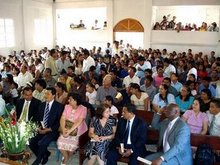Cyclone Aila made landfall on the southwestern coast of Bangladesh on May 25 killing approximately 180 people, displacing more than 500,000, and destroying homes, businesses, and thousands of acres of cropland, reports the Adventist Development and Relief Agency (ADRA).
"Many villages are still underwater and because of the rainfall, we are afraid that the situation of survivors will continue to deteriorate," said Elidon Bardhi, country director for ADRA Bangladesh. "Currently, people are in desperate need for basic necessities, including medical assistance, food, and clean water."
On June 1, ADRA distributed emergency supplies to survivors within the severely affected sub-district of Tala, in Satkhira District near the border with India, providing assistance to 1,200 families, including rice, lentils, rice, sugar, salt, oral rehydration salts, and water purification tablets.
According to ADRA staff on the ground, severe food and water shortages have affected many villages. In some low-lying areas, seawater has contaminated water supplies, leaving communities with little or no access to drinking water.
"People were very happy to receive the emergency supplies," said Bardhi. "At least for now, they will be able to forget their hunger, and focus on the recovery process."
Local officials stated that ADRA was the first aid organization to distribute relief supplies in the region since the cyclone hit. ADRA’s emergency response group remains on-site, and continues to survey and monitor the situation.
In neighbouring eastern India, Cyclone Aila also killed a least 150 people and left more than 150,000 homeless. The heavy rain caused numerous landslides and damaged large agricultural areas.
About 80 percent of Bangladesh’s rain accumulation occurs during the annual monsoon season, which lasts from June to October. Bangladesh is particularly vulnerable due to its general low elevation and high population density.
ADRA is a non-governmental organization present in 125 countries providing sustainable community development and disaster relief without regard to political or religious association, age, gender, race or ethnicity.

